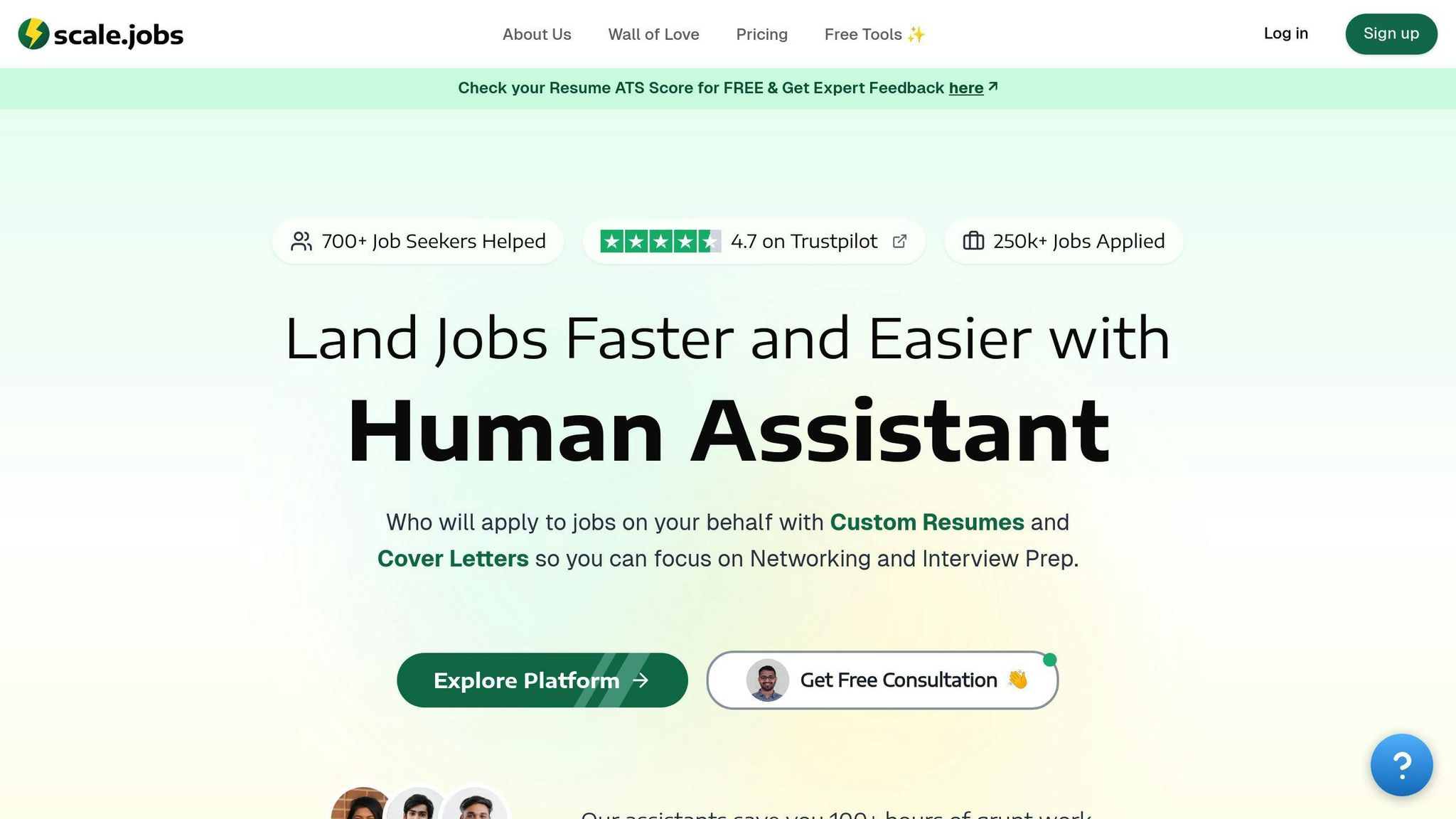5 EQ Tips for Better Salary Negotiations
Enhance your salary negotiations with these 5 emotional intelligence tips to build trust, stay calm, and communicate effectively.

Here’s the quick breakdown:
- Build Empathy: Understand the employer’s perspective - budget limits, pay structures, and company goals. Use active listening to find common ground.
- Research Your Worth: Use platforms like Glassdoor and LinkedIn Salary to back your requests with data and set realistic expectations.
- Stay Calm: Keep your composure under stress, and focus on creative solutions like non-salary perks (e.g., remote work, bonuses).
- Prepare Your Pitch: Highlight achievements, tie them to market trends, and practice responses to objections.
- Use Emotional Control: Stay professional, adapt to feedback, and aim for mutually beneficial outcomes.
Why EQ matters: It helps you stay composed, build trust, and communicate effectively - key skills for a successful negotiation.
Want more details? Let’s dive in.
Top Tips For Negotiating Salaries
1. Build Empathy During Salary Talks
Approaching salary negotiations with empathy can set a positive tone, making both sides feel heard and valued. By understanding the employer's perspective, you can find common ground that benefits both parties.
Understand the Employer's Perspective
Do your homework on the company's current situation, industry landscape, and internal goals. This can help you tailor your approach when discussing compensation. Pay attention to areas like:
- Budget limitations: Be open to discussing alternative forms of compensation.
- Internal pay structure: Acknowledge the importance of maintaining fair salary ranges.
- Company objectives: Highlight how your skills and contributions can support their goals.
Aligning your requests with their priorities shows that you're not just thinking about your needs but theirs as well.
Practice Active Listening
Engage fully in the conversation by maintaining eye contact, jotting down key points, and asking clarifying questions. If the employer raises concerns, acknowledge them before suggesting solutions. This approach demonstrates that you’re willing to collaborate and find a balance that works for both sides.
2. Research Your Worth Before Negotiations
Knowing your market value is key to entering salary negotiations with confidence and solid evidence. By understanding what you're worth, you can make informed arguments and avoid decisions driven by emotions.
How to Research Salary Data
Platforms like Glassdoor, Payscale, and LinkedIn Salary are great tools for gathering information about industry pay standards, regional differences, and compensation based on specific skills. Focus on roles similar to the one you're targeting, and take into account factors like company size, industry, and cost of living.
This research helps you:
- Set realistic salary expectations
- Approach negotiations with confidence
- Back your requests with data
- Spot areas for career growth
Presenting Your Findings
Once you've done your homework, it's important to present your findings in a way that connects your value to market trends and the company's needs. Here's how to do it:
- Explain Your Research in Context: Share how your skills and experience align with market trends, using specific data to justify your desired salary range. For example, you might say, "Based on my research of similar positions and the company's current growth phase, I believe a range of [X] to [Y] is fair."
- Be Ready for Questions: Keep your data handy and be prepared to explain your numbers. This shows you're professional and thoughtful about the process.
With thorough research in hand, you'll be better equipped to navigate negotiations confidently and stay composed, even if the discussion gets tough.
3. Stay Calm and Open During Negotiations
Keep Your Composure Under Stress
Preparation is critical, but staying calm during the negotiation itself is what ensures your hard work pays off. Using emotional intelligence can help you think clearly and make sound decisions, even under pressure.
"Maintaining a strong relationship is as vital as achieving your goals." - MSBCoach
Here are some tips to help you stay composed:
- Pause mindfully: Before reacting to tough questions or counteroffers, take a moment to breathe and gather your thoughts. This helps you respond thoughtfully instead of impulsively.
- Engage in active listening: Focus on understanding the other person’s perspective to stay engaged and avoid emotional reactions.
- Prepare for objections: Practice your responses ahead of time so you can remain confident when challenges arise.
Think Beyond Salary
When salary increases aren’t on the table, emotional intelligence can guide you toward creative solutions that work for both sides. Smart negotiators know that compensation includes much more than just base pay.
Here’s a breakdown of valuable non-salary benefits:
| Category | Examples | Why It Matters |
|---|---|---|
| Work-Life Balance | Remote work, flexible hours, PTO | Offers better work-life integration without extra cost to the company |
| Professional Growth | Training budgets, conferences, mentorship | Boosts your long-term career prospects |
| Health & Wellness | Health insurance, wellness programs | Saves money on personal expenses |
| Financial Benefits | Stock options, retirement matching, bonuses | Builds financial security over time |
When negotiating these perks:
- Show that you understand the company’s limitations.
- Express gratitude for any alternative offers.
- Aim for solutions that benefit both you and the employer.
- Use research and data to support your requests.
4. Prepare and Practice Ahead of Time
Craft a Strong Salary Pitch
Getting ready for salary discussions means having a clear and convincing pitch. A solid pitch shows not just your professional worth but also your ability to communicate effectively.
Here’s what to include in your pitch:
- Value Statement: Highlight specific achievements with measurable results. For example, "I increased team productivity by 35% by streamlining workflows and mentoring junior staff."
- Market Research: Use up-to-date salary data to justify your request. Tie this information to your skills and how they meet the company’s needs.
- Future Contributions: Explain how you plan to help the company achieve its goals.
| Component | Focus On | Avoid |
|---|---|---|
| Value Statement | Clear achievements with metrics | Vague job descriptions |
| Market Research | Industry-standard salary ranges | Competitor-specific salaries |
| Future Impact | Tangible plans for company growth | Unclear or generic promises |
Once you’ve prepared your pitch, it’s time to practice delivering it confidently.
Practice for Different Scenarios
Rehearsing your pitch not only improves your delivery but also helps you handle unexpected situations with ease. Emotional intelligence plays a key role here, allowing you to stay calm and adapt as needed.
"Emotional intelligence helps improve communication, collaboration, and decision-making, which are all essential components of successful salary negotiations." - Amit Chilka
To refine your approach, practice with a mentor or record yourself. Pay attention to:
- Body Language: Keep an open posture and maintain steady eye contact.
- Tone of Voice: Aim for confident, calm speech - never aggressive.
- Response Time: Take a moment to think before answering tough questions.
Prepare for scenarios like these:
- Objections due to budget constraints
- Concerns about your level of experience
- Counter-offers that fall short of your expectations
- Questions about your current salary
For each situation, develop responses that acknowledge the employer’s viewpoint but firmly express your stance. This balance demonstrates emotional intelligence and strengthens your position in the negotiation.
Wrapping Up: Key Points for Salary Negotiations
Summary of the 5 Tips
Emotional intelligence plays a crucial role in salary negotiations. It helps you build trust, stay composed, and approach discussions with empathy and preparation. Here are some strategies that can lead to better outcomes:
| Strategy | How to Apply It |
|---|---|
| Understanding and Responding to Employer Needs | Use active listening, show empathy, and align your goals with the company's priorities |
| Data-Driven and Well-Practiced Approach | Back your discussions with research and practice different scenarios in advance |
| Emotional Control | Stay calm and maintain a professional tone, even under pressure |
These approaches not only help you negotiate effectively but also strengthen your professional relationships.
Encouragement for Jobseekers
Negotiating isn't just about securing a higher salary - it's about building trust and mutual understanding. When you combine solid preparation with emotional intelligence, you pave the way for agreements that work for both sides.
"Emotional intelligence helps improve communication, collaboration, and decision-making, which are all essential components of successful salary negotiations."
To succeed in salary negotiations, focus on these three elements:
- Clearly communicate your value to the company
- Be open to discussing different compensation options
- Understand your worth while considering the employer's limitations
Using emotional intelligence means more than just managing your own emotions. It’s about fostering an atmosphere where both sides feel heard and respected, which can lead to stronger relationships and better outcomes over time.
Resource Spotlight: Scale.jobs

Preparation and emotional intelligence are crucial for successful salary negotiations, but having the right support can give you an extra edge.
What Scale.jobs Offers

Scale.jobs connects you with virtual assistants who create personalized resumes and cover letters, allowing you to focus on getting ready for salary discussions. At just $4/hour, this service helps job seekers by crafting materials that showcase their strengths while they concentrate on negotiation strategies.
Here’s what you get:
- Tailored resumes and cover letters that highlight your achievements
- More time to research salaries and practice negotiation skills
- Expert guidance throughout your job search journey
Free Tools for Jobseekers
Scale.jobs also offers free tools designed to boost your salary negotiation prep:
- Salary Predictor: Find competitive pay ranges for your role
- Resume ATS Checker: Ensure your resume passes applicant tracking systems
- Interview Questions Predictor: Prepare for negotiation-related interview questions
These tools work hand-in-hand with emotional intelligence strategies, giving you both data and confidence to approach negotiations effectively. With Scale.jobs, you can focus on building a strong case for your next salary discussion.




